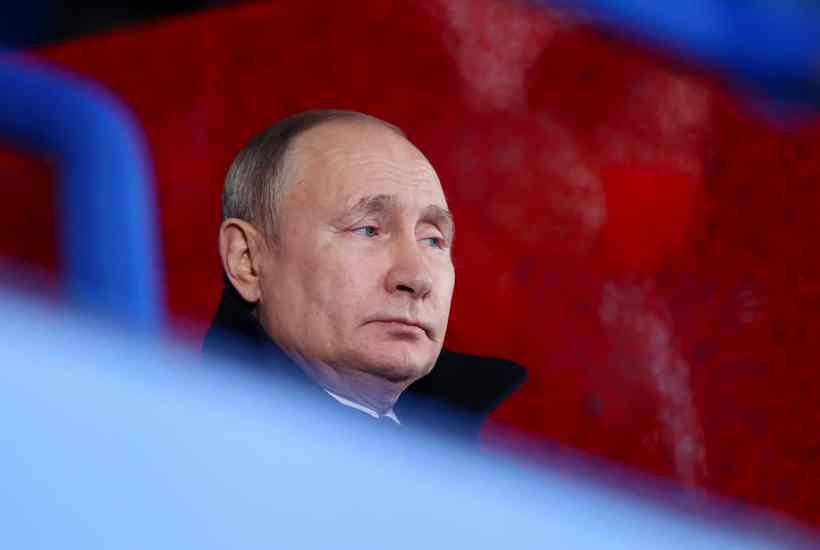The Lithuanian prime minister, Ingrida Šimonyte, put it well yesterday: ‘the way we respond will define us for the generations to come’.
The invasion of Ukraine started last night with Vladimir Putin’s order to send troops into eastern Ukraine. He had earlier recognised the breakaway provinces of Donetsk and Luhansk, which together constitute the Donbas region, as independent republics. The two self-proclaimed states declared their independence — something neither Kiev nor any other third country save Russia has yet recognised — following 2014 following the Maidan revolution.
The US, UK and EU say they will announce fresh sanctions as early as today. What we know is that the technicalities have been drawn up. Ursula von der Leyen revealed that Russia will be cut from the global financial markets. But there are rumours that the Germans — who else? — insisted on back channels to allow some Russian banks continued access to western finance. The Americans and east Europeans are pushing. Berlin and Rome are pushing back.
The big question is not so much what will be in the package, but what the package will accomplish. Listening to Putin’s speech to the Russian nation yesterday, it became clear that sanctions will not stop him. There was an air of madness in him. He gave a lesson in fake history, about Lenin’s apparent role in creating the Ukrainian republic, and about how Russia was misled on Nato enlargement. Putin is a man on a historic mission. The only conceivable effect of sanctions is to inflict so much pain on the country that it would indirectly help the Russian opposition. For this to work, the sanctions would have to include gas, Russia’s main export. And the cut-off from international finance would have to be total. This won’t happen.
So what do we know? Mark Rutte, the Dutch Prime Minister, had already said the package will be limited. So don’t expect an all-out trade and finance ban. However, the US will likely cut the Russians off from the dollar markets. They may impose sanctions on individuals. Watch out for former German chancellor Gerhard Schröder and other Nord Stream 2 executives. The company itself, and its new German subsidiary, could be targeted by the US. Will Washington target a former German premier? Nord Stream 2 is now dead, simply because the US will not let it happen. But this is irrelevant to the current energy crisis because no gas flows through it.
The question is whether Washington will cement its own sanctions with secondary sanctions on European companies that provide back channels to Russia. Eventually, it looks likely that this will happen, especially if the Republicans win the midterm elections.
It has been reported that the EU and US have worked together on export bans of physical goods. Experts have been going through long lists of product numbers as they do when they impose trade sanctions. Affected areas include artificial intelligence, lasers and sensors, dual-use defence goods and aerospace technology. As von der Leyen put it, this will make it impossible for Russia to modernise its ageing industries: Russia is dependent on the West for these goods.
An important consideration is China. Will Russia be able to weather the impact of sanctions by substituting imports from China? The answer is: to some extent. China is playing an interesting double-game. Wang Yi, China’s foreign minister, warned that the territorial integrity and independence of countries should be respected and that this should include Ukraine. But China will happily do business with Russia.
Russia’s trading volume with the EU is €174 billion. Its trade with China is €147 billion, but went up by 36 per cent last year. Most of the trading volumes with Europe consists of Russian gas, which will not be on the sanctions list. It will not be easy for Russia to plug high-tech gaps from Chinese imports. China, itself the subject of US sanction, is catching up on some of the western technological monopolies.
The issue is not so much trade volumes, but trade quality. The list of sanctions may well include technologies Russia cannot easily acquire from China in the short run. Russia and China recently announced a bilateral gas supply deal. It did not go as far as Putin had hoped. For China, Russian gas pipelines mean the exact opposite of what they mean for Europeans. It gives China an additional source of gas, a diversification from its existing suppliers. The Chinese are by far the most strategic player on the Eurasian continent. This conflict will end up raising China’s pre-dominance further.
This conflict is not on the same level as the big 20th century imperial wars. It is instead an attempt by Russia to create a sphere of influence. In some ways, Putin is continuing the Brezhnev doctrine from 1968, under which the Soviet Union would intervene in countries where socialist rule was under threat. This was a direct response to the Prague Spring of that year, which was ended by Soviet tanks. Then, the threat of western defection was decisively stopped by Moscow. The question is whether Putin will be able to reverse much of the westernisation that has already taken place across the former satellite states.
This article was first published in the EuroIntelligence morning briefing. For a trial subscription click here.
Got something to add? Join the discussion and comment below.
Get 10 issues for just $10
Subscribe to The Spectator Australia today for the next 10 magazine issues, plus full online access, for just $10.




















Comments
Don't miss out
Join the conversation with other Spectator Australia readers. Subscribe to leave a comment.
SUBSCRIBEAlready a subscriber? Log in